Atheta makepeacei
| Notice: | This page is derived from the original publication listed below, whose author(s) should always be credited. Further contributors may edit and improve the content of this page and, consequently, need to be credited as well (see page history). Any assessment of factual correctness requires a careful review of the original article as well as of subsequent contributions.
If you are uncertain whether your planned contribution is correct or not, we suggest that you use the associated discussion page instead of editing the page directly. This page should be cited as follows (rationale):
Citation formats to copy and paste
BibTeX: @article{Webster2016ZooKeys, RIS/ Endnote: TY - JOUR Wikipedia/ Citizendium: <ref name="Webster2016ZooKeys">{{Citation See also the citation download page at the journal. |
Ordo: Coleoptera
Familia: Staphylinidae
Genus: Atheta
Name
Atheta makepeacei Klimaszewski & Webster sp. n. – Wikispecies link – ZooBank link – Pensoft Profile
Holotype (male)
Canada, New Brunswick, Carleton Co., Hay Settlement, 46.0339°N, 67.5797°W, 24.V.2007, S. Makepeace & R. Webster, coll. // nest box contents of Barred Owl (1 litre), moist smelly (urine smell) organic material (mostly wood chips), with small bones and insect parts (LFC). Paratypes: Canada, New Brunswick, Carleton Co., Hay Settlement, 46.0339°N, 67.5797°W, 24.V.2007, S. Makepeace & R. Webster, coll. // nest box contents of Barred Owl (1 litre), moist smelly (urine smell) organic material (mostly wood chips), with small bones and insect parts (1 ♀, LFC); Benton, 45.99611°N, 67.58640°W, 24.V.2007, S. Makepeace & R. Webster, coll. // Nest contents of Barred Owl, young chicks present, moist smelly organic material and regurgitated pellets, feathers, fur, & small bones (1 ♀, RWC); Jackson Falls, “Bell Forest”, 46.2200°N, 67.7230°W, 7.VIII.2009, R.P. Webster // Rich Appalachian Hardwood Forest, on gilled mushroom (1 ♀, RWC). Queens Co., Rees, near Grand Lake, 46.00164°N, 65.94656°W, 29.V.2007, S. Makepeace & R. Webster, coll. // Nest contents of Barred Owl, moist smelly organic material and regurgitated pellets, feathers, fur, & small bones (1 ♂, RWC).
Etymology
This species is named in honor of Scott Makepeace who collected the contents from barred owl (Strix varia Barton) nests that contained most specimens of this species.
Description
Body length 2.7 mm, moderately narrowly elongate; head, pronotum, and most of abdomen except for basal part black, antennae, legs brown, and elytra brown mottled with black (Fig. 120); integument moderately glossy; forebody with minute and moderately dense punctation and pubescence; head rounded posteriorly, with moderately large eyes, antenna with articles V–X slightly transverse and progressively more so toward apex; pronotum rounded anteriorly and posterolaterally, transverse, wider than head and narrower than elytra, pubescence directed laterad from midline of disk; elytra transverse, with pubescence directed posterolaterad and some with wavy pattern near suture; abdomen at base almost as broad as elytra, broadly arcuate laterally. Male. Median lobe of aedeagus with bulbus broad, oval, tubus long, narrowly triangular in dorsal view (Fig. 121), and produced ventrally, with apical part enlarged and narrowly triangular in lateral view (Fig. 122); internal sac with elongate structures (Figs 121, 122); tergite VIII with two apico-lateral teeth and sinuate apical margin (Fig. 123); sternite VIII rounded apically (Fig. 124). Female. Tergite VIII with apical margin broadly arcuate (Fig. 125); sternite VIII broadly rounded apically (Fig. 126); spermatheca with broad and elongate club-shaped capsule bearing large apical invagination and with sinuate stem narrowly looped and twisted posteriorly (Fig. 127).
Distribution
Known only from NB, Canada.
Natural history
Four of the adults were collected from the nest contents of barred owls (which nest in tree holes) that consisted of moist smelly organic material with regurgitated pellets, feathers, fur, and small bones. Another specimen was found in a gilled mushroom. It is possible that this species is associated with birds and other species that nest in tree holes. This species was found in old hardwood forests during May and August.
Comments
The aedeagus of Atheta makepeacei is unique for the triangular apical part of the tubus and the narrow apex in lateral view (Fig. 122); the shape of the spermatheca is also different from the remaining Nearctic Atheta species known to us. We have tentatively affiliated this species with the subgenus Dimetrota based on external body characteristics.
Original Description
- Webster, R; Klimaszewski, J; Bourdon, C; Sweeney, J; Hughes, C; Labrecque, M; 2016: Further contributions to the Aleocharinae (Coleoptera, Staphylinidae) fauna of New Brunswick and Canada including descriptions of 27 new species ZooKeys, (573): 85-216. doi
Images
|
